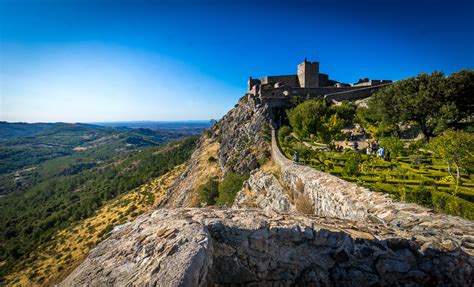When it comes to exploring the rich heritage of Portugal, the Alentejo region is a treasure trove of historic castles, enchanting wineries, and sprawling olive groves. From the ancient fortresses that dot the landscape to the traditional methods of olive oil production, the Alentejo region offers a glimpse into the country’s storied past and vibrant culture. In this blog post, we will delve into the fascinating world of Alentejo, uncovering the secrets of its historic castles, exploring the art of winemaking in its picturesque vineyards, and tasting the flavors of its renowned olive groves. Join us as we embark on a journey to preserve the rich cultural heritage of Alentejo and discover the hidden gems that make this region a must-visit destination for any traveler.
Exploring the Historic Castles of Alentejo
Alentejo is a region in Portugal known for its rich history and stunning architecture. One of the most captivating aspects of the region is its historic castles, each with its own unique story to tell. As you travel through Alentejo, you’ll have the opportunity to explore these ancient fortifications and immerse yourself in the medieval history of the area.
One of the most iconic castles in Alentejo is the Castle of Evoramonte, perched on a hilltop with commanding views of the surrounding countryside. This well-preserved fortress dates back to the 12th century and offers a glimpse into the region’s medieval past. As you wander through its stone walls and towers, you can’t help but feel transported back in time.
Another must-visit castle in Alentejo is the Castle of Monsaraz. This picturesque hilltop fortress is steeped in history and offers panoramic views of the surrounding landscape. From its cobbled streets to its ancient walls, the Castle of Monsaraz is a testament to the region’s storied past.
Exploring the historic castles of Alentejo is not just a journey through time, but also an opportunity to appreciate the architectural marvels that have stood the test of time. Each castle has its own unique charm and character, making them a highlight of any visit to this enchanting region.
Unveiling the Enchanting Wineries of Alentejo
Alentejo, Portugal is renowned for its enchanting wineries, producing some of the finest wines in the region. The rolling hills and sun-drenched vineyards create the perfect conditions for grape cultivation, resulting in world-class wines that reflect the unique terroir of Alentejo. Visitors to the region have the opportunity to immerse themselves in the fascinating world of winemaking, from touring the vineyards to tasting the exquisite wines.
One of the most captivating aspects of the wineries in Alentejo is their commitment to sustainable and organic winemaking practices. The winemakers in this region take great pride in cultivating their grapes in harmony with nature, ensuring that each bottle of wine is a true reflection of the land from which it came. This dedication to sustainability not only produces exceptional wines, but also preserves the natural beauty of the Alentejo countryside for future generations to enjoy.
Visitors to the enchanting wineries of Alentejo will have the opportunity to explore the rich history and traditions of winemaking in the region. Many of the wineries have been in operation for generations, with each passing down their expertise and passion for winemaking to the next. From learning about the ancient techniques used to craft the wines to sampling the delicious varietals, the wineries of Alentejo offer a truly immersive experience for wine enthusiasts.
Whether you are a seasoned oenophile or simply enjoy a good glass of wine, the wineries of Alentejo are a must-visit destination. The combination of breathtaking scenery, exceptional wines, and warm hospitality make for an unforgettable experience that will leave a lasting impression on anyone who has the pleasure of visiting these enchanting wineries.
Delving into the Art of Olive Oil Production
When it comes to the production of olive oil, the region of Alentejo holds a special place in the world. The unique climate and fertile soil of this area contribute to the cultivation of some of the finest olives in the world, making it an ideal location for olive oil production.
One of the most intriguing aspects of olive oil production in Alentejo is the traditional methods that are still used to this day. The process begins with the careful selection of olives, which are then handpicked and sorted to ensure only the best are used for oil production.
Once the olives have been selected, they are taken to the local olive press where they undergo the process of extraction. This involves crushing the olives to extract the oil, which is then separated from the pulp and water. The resulting olive oil is then stored in vats to allow it to settle and mature, enhancing its flavor and quality.
Visitors to Alentejo have the opportunity to witness this fascinating process firsthand by taking guided tours of olive oil farms and presses. This provides a unique insight into the art of olive oil production and allows visitors to sample the various olive oils produced in the region.
Tasting the Flavors of Alentejo’s Olive Groves
When visiting Alentejo, one of the most delightful experiences is to taste the flavors of the region’s olive groves. The rich, fertile soil and Mediterranean climate of Alentejo provide the perfect conditions for growing olives, resulting in some of the finest olive oil in the world.
Exploring the olive groves of Alentejo allows visitors to not only enjoy the stunning natural beauty of the landscape but also to learn about the traditional methods of olive oil production that have been passed down through generations. The distinct flavors of the olives can be savored through guided tastings, where you can sample different varieties of olive oils and discover the unique characteristics of each.
From the intense and peppery notes of the Cobrançosa olive oil to the smooth and buttery flavors of the Cordovil olive oil, the diversity of tastes is an integral part of the Alentejo olive oil experience. The passion and dedication of the local producers can be felt in every drop, making it a truly immersive and sensory journey.
Whether drizzled over freshly baked bread, used in salads, or incorporated into local dishes, the flavors of Alentejo’s olive groves add a distinctive and authentic touch to the region’s gastronomy, inviting visitors to savor the essence of Alentejo in every bite.
Preserving the Rich Cultural Heritage of Alentejo
Alentejo, Portugal, is a region with a rich cultural heritage that dates back centuries. The people of Alentejo have worked tirelessly to preserve their traditions, customs, and historical sites, making it a fascinating destination for travelers looking to immerse themselves in the authentic culture of Portugal.
From ancient castles and Roman ruins to traditional crafts and unique festivals, the cultural heritage of Alentejo is a treasure trove waiting to be discovered. The locals take great pride in sharing their heritage with visitors, making it a truly immersive experience.
One of the most remarkable aspects of Alentejo’s cultural heritage is the preservation of traditional music and dance. The region is known for its vibrant folk music and lively dancing, which are integral parts of local celebrations and gatherings.
Furthermore, the culinary traditions of Alentejo play a significant role in preserving its cultural heritage. The time-honored recipes and local ingredients reflect the region’s history and are an essential part of the authentic Alentejo experience.
Frequently Asked Questions
What are some historic castles to explore in the Alentejo region?
The Alentejo region is home to many historic castles, including the Castelo de Monsaraz, the Castelo de Evoramonte, and the Castelo de Estremoz.
What can visitors expect to experience at the wineries of Alentejo?
Visitors to the wineries of Alentejo can expect to experience wine tastings, tours of the vineyards and cellars, and the opportunity to learn about the winemaking process.
How is olive oil produced in the Alentejo region?
Olive oil in the Alentejo region is produced through traditional methods, including the crushing of the olives, pressing the paste, and separating the oil from the water and pulp.
What are some unique flavors to taste at the olive groves of Alentejo?
Visitors to the olive groves of Alentejo can taste a variety of olive oils, including those made from different olive varieties and flavored oils infused with herbs and spices.
How is the rich cultural heritage of Alentejo preserved?
The rich cultural heritage of Alentejo is preserved through efforts to safeguard historic sites, traditional crafts, and local gastronomy, as well as through festivals and events that celebrate regional traditions.






